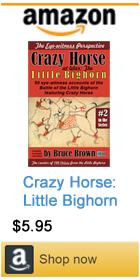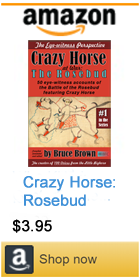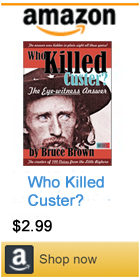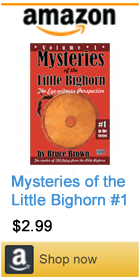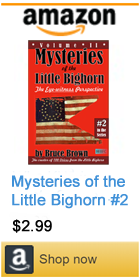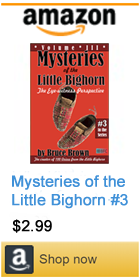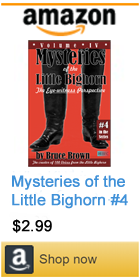|
||||||||||||
Bruce Brown's 100 Voices... The letter by Frederick Benteen
THE "WASHITA" LETTER THAT ENRAGED CUSTER FOLLOWING is the text of the letter setting forth some unwritten history concerning the battle of the Washita, that so enraged General Custer. It was written by Captain F. W. Benteen of the Seventh to his friend William J. De Gresse of St. Louis, who furnished it to the St. Louis Democrat, in which paper it was immediately published, and was copied by the New York Times, 14 February 1869. Benteen refers to it in his letter of 17 February 1896 to Theo. W. Goldin, one of the Benteen-Goldin series of letters included in this volume. General Godfrey told me, as did also Major F. W. Benteen, Jr., that this letter and its publication was the moving cause of Custer's threat to horsewhip his critic, a lively incident which Benteen describes in his letter of 22 February 1896 to Goldin.
Death and Barbarous Treatment of Maj. Elliott and His Band-Destruction of the Indian Camp and Property. The St. Louis Democrat publishes the following letter from a participant in the battle of Washita, Idaho (sic) [Indian Territory], which gives some of the secret history of that fight, and accounts for the fact of Maj. Elliott and his men being reported missing: Fort Cobb, I. T., Dec. 22, 1868. MY DEAR FRIEND: I wrote to you from Camp Supply, which place was left on the 7th, arriving at this post on the evening of the 18th. On the 11th we camped within a few miles of our "battle of the Washita," and Gens. Sheridan and Custer, with a detail of one hundred men, mounted, as escort, went out with the view of searching for the bodies of our nineteen missing comrades, including Maj. Elliott. The bodies were found in a small circle, stripped as naked as when born, and frozen stiff. Their heads had been battered in, and some of them had been entirely chopped off; some of them had had the Adam's apple cut out of their throats; some had their hands and feet cut off, and nearly all had been horribly mangled in a way delicacy forbids me to mention. They lay scarcely two miles from the scene of the fight, and all we know of the manner they were killed we have learned from Indian sources. It seems that Maj. Elliott's party were pursuing a wellmounted party of Cheyennes in the direction of the Grand Village, where nearly all the tribes were encamped, and were surrounded by the reinforcements coming to the rescue of the pursued, before the Major was aware of their position. They were out of sight and hearing of the Seventh Cavalry, which had remained at and around the captured village, about two miles away. As soon as Maj. Elliott found that he was surrounded he caused his men to dismount, and did some execution among the Indians, which added to the mortification they must have felt at the loss of the village and herds of their friends and allies, and enraged them so that they determined upon the destruction of the entire little band. Who can describe the feeling of that brave band, as with anxious beating hearts, they strained their yearning eyes in the direction whence help should come? What must have been the despair that, when all hopes of succor died out, nerved their stout arms to do and die? Round and round rush the red fiends, smaller and smaller shrinks the circle, but the aim of that devoted, gallant knot of heroes is steadier than ever, and the death howl of the murderous redskin is more frequent. But on they come in masses grim, with glittering lance and one long, loud, exulting whoop, as if the gates of hell had opened and loosed the whole infernal host. A well-directed volley from their trusty carbines makes some of the miscreants reel and fall, but their death-rattles are drowned in the greater din. Soon every voice in that little band is still as death; but the hellish work of the savages is scarce begun, and their ingenuities are taxed to invent barbarities to practice on the bodies of the fallen brave, the relation of which is scarcely necessary to the completion of this tale. And now, to learn why the anxiously-looked for succor did not come, let us view the scene in the captured village, scarce two short miles away. Light skirmishing is going on all around. Savages on flying steeds, with shields and feathers gay, are circling everywhere, riding like devils incarnate. The troops are on all sides of the village, looking on and seizing every opportunity of picking off some of those daring riders with their carbines. But does no one think of the welfare of Maj. Elliott and party? It seems not. But yes! a squadron of cavalry is in motion. They trot; they gallop. Now they charge! The cowardly redskins flee the coming shock and scatter here and there among the hills scurry away. But it is the true line-will the cavalry keep it? No! no! They turn! Ah, 'tis only to intercept the wily foe. See! a gray troop goes on in the direction again. One more short mile and they will be saved. Oh, for a mother's prayers! Will not some good angel prompt them? They charge the mound-a few scattering shots, and the murderous pirates of the Plains go unhurt away. There is no hope for that brave little band, the death doom is theirs, for the cavalry halt and rest their panting steeds. And now return with me to the village. Officers and soldiers are watching, resting, eating and sleeping. In an hour or so they will be refreshed, and then scour the hills and plains for their missing comrades. The commander occupies himself in taking an inventory of the captured property which he had promised the officers shall be distributed among the enlisted men of the command if they falter or halt not in the charge. The day is drawing to a close and but little has been done save the work of the first hour. A great deal remains to be done. That which cannot be taken away must be destroyed. Eight hundred ponies are to be put to death. Our Chief exhibits his close sharp-shooting and terrifies the crowd of frighted, captured squaws and papooses by dropping the straggling ponies in death near them. Ah! he is a clever marksman. Not even do the poor dogs of the Indians escape his eye and aim as they drop dead or limp howling away. But are not those our men on guard on the other side of the creek? Will he not hit them? "My troop is on guard, General, just over there," says an officer. "Well, bullets will not go through or around hills, and you see there is a hill between us," was the reply, and the exhibition goes on. No one will come that way intentionally certainly not. Now commences the slaughter of the ponies. Volley on volley is poured into them by too hasty men, and they, limping, get away only to meet death from a surer hand. The work progresses! The plunder having been culled over, is hastily piled; the wigwams are pulled down and thrown on it, and soon the whole is one blazing mass. Occasionally a startling report is heard and a steamlike volume of smoke ascends as the fire reaches a powder bag, and thus the glorious deeds of valor done in the morning are celebrated by the flaming bonfire of the afternoon. The last pony is killed. The huge fire dies out; our wounded and dead comrades-heroes of a bloody day-are carefully laid on ready ambulances, and as the brave hand of the Seventh Cavalry strikes up the air, "Ain't I glad to get out of the Wilderness," we slowly pick our way across the creek over which we charged so gallantly in the early morn. Take care! do not trample on the dead bodies of that woman and child lying there! In a short time we shall be far from the scene of our daring dash, and night will have thrown her dark mantle over the scene. But surely some search will be made for our missing comrades. No, they are forgotten. Over them and the poor ponies the wolves will hold high carnival, and their howlings will be their only requiem. Slowly trudging, we return to our train, some twenty miles away, and with bold, exulting hearts, learn from one another how many dead Indians have been seen. Two weeks elapse-a larger force returns that way. A search is made and the bodies are found strewn round that little circle, frozen stiff and hard. Who shall write their eulogy? The Custer Myth: A Source Book of Custerania, written and compiled by Colonel W.A. Graham, The Stackpole Co., Harrisburg, PA 1953, p 211 - 213
Capt. Frederick Benteen commanded one of Custer's three wings after Custer divided his troops on June 25, 1876. Custer's famous "last order," carried by John Martin, directed Benteen, his best battlefield commander, to "Come on. Big village. Be quick." Benteen was responding to Custer's order when he found Major Marcus Reno -- who led the attack -- and his badly mauled troops fighting for their lives on the east side of the river. Half of Reno's men were already dead or missing, and Reno beseached him, "for God's sake, Benteen, halt your command and wait until I can organize my men." Benteen halted, providing Reno the support that Custer had promised but never provided to the point man on the American attack. White Man Runs Him said Reno's reninforcement by Benteen and McDougall (both of whom had been summoned in Custer's last order) saved all their lives. "If those soldiers [Reno's men] hadn't turned back and been reinforced by the pack train they would all have been killed. The Sioux were coming up fast." After "Wier's company was sent out to communicate with Custer" and was quickly driven back by an "immense body of Indians," Benteen, McDougall and Reno entrenched together in the bluffs above the Little Bighorn, where Benteen's coolness under fire was remarked upon by many during the Seige of the Greasy Grass. William O. Taylor said Benteen was "one of the bravest acting men of our entire command." Here's Private George W. Glenn's account of Benteen exhorting his men along the battle line, and here's Trumpeter John Martin's account of Benteen's quintessentially American response to having the heel of his boot shot off by the Sioux, possibly the Oglala Sioux marksman White Cow Bull, who described a similar incident. Please note: this detail was NOT in Benteen's letter to his wife! Seventh Cavalry surgeon Dr. H.R. Porter spoke for many when he said, "Although Reno was ranking officer, Colonel Benteen was really in command, and to his coolness and bravery those of us who were saved owe our lives." Another quality of Benteen's -- writ as large and plain as his personal bravery and effectiveness as a battlefield commander -- was his hatred of his commanding officer, Col. George A. Custer, whom Benteen had once publically attacked for abandoning his men at the Washita Massacre. "I'm only too proud to say that I despised him," Benteen said of Custer. Yet in the margin of the July 4, 1876 letter to his wife, Benteen scrawled with grief overflowing the normal bounds of the page: ". . . Boston Custer and young Mr. Reed, a nephew of Genl. Custer, were killed, also Kellogg, the reporter..." * * * Here is Frederick Benteen's letter to his wife 10 days after the battle, as well as his account for the New York Herald six weeks later.
|
||||||||||||



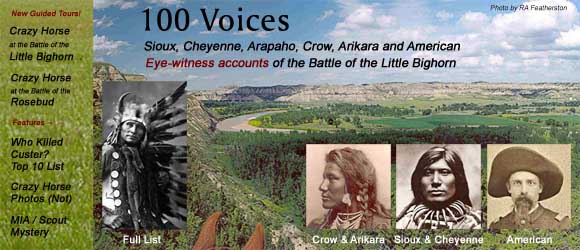
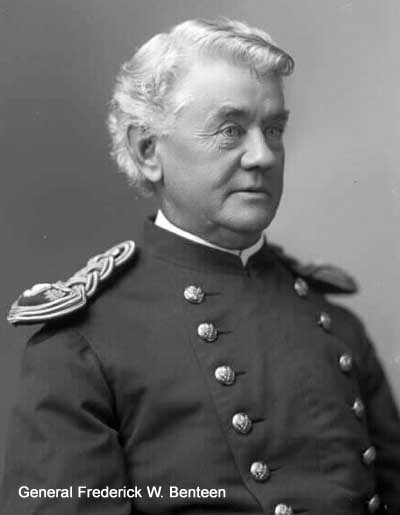 THE BATTLE OF THE WASHITA
THE BATTLE OF THE WASHITA
